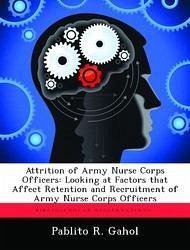Nursing shortage has been a challenge for the U.S. Army Nurse Corps. Currently, it is short of its budgeted end strength and continues to have an increasing number of nurses leaving the Army. Additionally, the US Army Recruiting Command (USAREC) and the Reserve Officers' Training Corps (ROTC) are facing a challenge in meeting their recruitment goals. This research studied the factors that influenced the attrition of nurses in the Army. Additionally, it examined the correlation of the current deployment, increased OPTEMPO, the civilian nursing shortage and the influence of pay and benefits to recruitment and retention of Army nurses. Furthermore, analysis was conducted on what senior Army Nurse Corps leadership can do to prevent the attrition and to increase recruitment of nurses in the Army. In a survey of Army Nurse Corps officers that recently left active duty, more than 70 percent of the respondents stated they originally intended to stay in the military past their initial obligation. The analysis indicates that there is a direct relationship between deployments, increased OPTEMPO, limited and/or lack of incentive pay and special bonus, lack of compensation for extra hours work, civilian nursing shortage and the attrition of Army Nurse Corps officers. Senior nursing leadership must invest time and effort to teach, coach, mentor and understand junior officers because they can influence the young officers to accept Army goals, mores and objectives, and eventually yield to a greater sense of belonging and acceptance in the organization.








